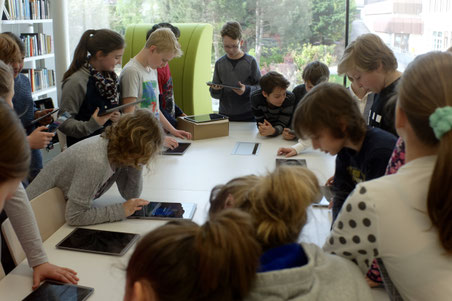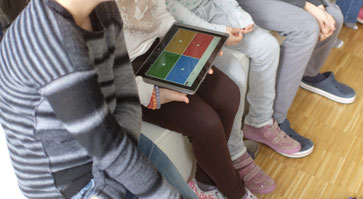
When talking about improvements of our educational system, there are a lot things to consider. To my mind, it all comes down to the learning environment we create for our students. And I do not mean that strictly architecturally. More than anything, creating a learning environment is a pedagogical question. There are many different types of learning spaces. But the most important thing is the focus on the result, the pedagogical outcome. I could not care less about the name of any given type of school, these questions are normally answered on a political level. All we should care about are the effects on our students. Basically, schools need to get closer to the real life. But what does that mean?
Student-centered is the only option!
A teacher centered approach where teachers stand in front of the blackboard while hoping their students do not fall asleep should be banished forever. Make students feel like they have a relevant input on what is happening in class. When I mentioned that schools need to be closer to reality, I referred to the way we work as adults. Fostering group work among students, creates an atmosphere where students feel like they are contributing to the class outcomes in a relevant way. Bearing in mind that in the business world we usually work together in teams, group work among students is a wonderful way to prepare them and train social skills.
Self-dependent students?
Isn’t the ultimate goal of schooling to teach students to evaluate themselves realistically in order for them to be better human beings? Being self-dependent has a lot to do with self awareness. Also, to understand other people, you need to get to know yourself. But teaching self-dependent students also has a lot to do with the right assessment. Students need a clear assessment and I do not believe in school systems without any assessment. Nevertheless, I look at it in a different way. In my opinion - and that concurs with a lot of pedagogues - it is really a matter of the individual reference point when assessing students.
What do I mean by that? You have to consider the individual talents and challenges. If a student is extremely gifted in mathematics, a C would be quite bad. But if someone has major deficits or challenges in calculating, a C would be excellent. A pedagogical learning environment has to take these factors into consideration. First we need to look at the student’s individual talents, then we should design a learning scenario that suits him. Therefore talking about learning environments is a pedagogical question.
Form follows function!

More than anything, a learning space/environment is a pedagogical setting. And adapting the pedagogical setting does not cost money. It just needs a motivated teacher. And the teacher would also be the one knowing how to integrate new technologies in a pedagogical sense. First and foremost, we have to think about our pedagogical goals and primary settings. Then, we can think about the space that is available and how to adapt it. Not the other way around. Often, teachers approach me and tell me that they have a lot of architectural restriction. If the classroom follows the pedagogical setting adapted by the teacher, it can look very different with very few aids. Try to rearrange the tables in the classroom. For example, I bet that suddenly it looks very different.
Don’t wait!!!
The most important lesson I have learned in educational policy is not to wait for anything. If we wait for politics to change anything, we would be getting very old. To a lesser degree the same applies for the regional school authority. The most effective way to stimulate change is by the teachers and students themselves. And little measures can have a major impact. Rearranging the tables in class, fostering group work and focussing on educating self-dependent students could be a great start. Most effectively, this could be done by emphasizing more on the competences rather than on the content taught in school. In my experience, the other stakeholders will follow if there is the slightest possibility to change anything. So don’t wait, our students are going to be very thankful …
